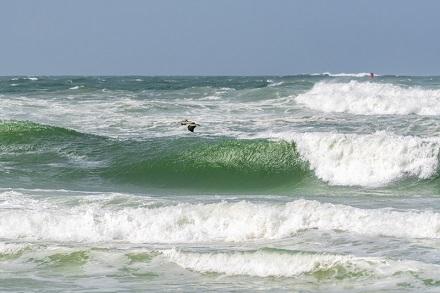

As the first major storm of the hurricane season, Barry made a terrible impression. He barged in uninvited, overstayed his welcome and left a mess behind. He was also too disorganized to provide anyone with firm traveling plans, which meant plenty of destinations had to scramble to figure out his itinerary.
The only consensus among many destinations seems to be that things could have been much worse – at least when compared with the large-scale devastation of storms like Katrina and Harvey. Many areas in Louisiana, for example, received heavy flooding, downed trees and similar problems but because the storm weakened when it made landfall, damage was less than predicted. The levees held and pumps worked, to the relief of residents.
That didn’t mean everyone was spared, though. According to the Orlando Sentinel, the Coast Guard rescued numerous individuals stranded by the rising waters (some of whom were taken off rooftops) and many lost homes and property.
The storm, having unleashed itself on Louisiana, turned toward Arkansas, with rain hitting western Tennessee and Kentucky, southeast Missouri and northwest Mississippi. Flash flood watches and warnings went as far as southeast Texas, and residents everywhere were warned of potential tornadoes. Power outages were reported in multiple states.
And as it traveled, the storm played havoc with summer sports, although certainly, to a lesser degree than might have been the case.
“We’re good,” said Carrie Stansbury of Cajun Coast Convention and Visitors Bureau, located in Morgan City, Louisiana. “Lots of tree branches down. Several events including the Elite Redfish Tournament were rescheduled, and Dixie Youth Baseball Tournament had to be moved to another town.”
In advance of the storm making landfall on the Louisiana coast, there was a flurry of cancellations and closures. Waterways in Ascension Parish and Livingston Parish as well as the False River in Pointe Coupee Parish closed to all recreational boating and fishing. In Baton Rouge, the Celebrity/Sorta Celebrity Softball Game was rescheduled. Three bicycle events and a car show were put on hold.
In Orleans Parish, people will have to wait for late August to see the Running of the Bulls (in which runners travel through the Warehouse District while being pursued by Viking-helmeted members of the Crescent City Roller Girls who are armed with plastic whiffle ball bats; watch this clip for the sheer entertainment value.)
In Broussard, the Broussard Sports Complex at St. Julien Park closed in advance of the storm, impacting prescheduled events.
One frustrating aspect of the storm for meteorologists was its complete unpredictability, a combination of three factors, according to the following synopsis from NOLA.com:
- Barry, who took his sweet time turning into a tropical system (eventually a tropical storm and very briefly a minimal hurricane) that could drop a lot of rain onshore.
- A pesky “boundary layer,” weather-speak for an old frontal system draped across the U.S. just north of Louisiana that blocked Barry from moving onshore.
- A continuing stream of dry air and associated wind shear that jumped over that boundary to suck moisture out of the atmosphere in Barry’s northeastern quadrant, where thunderstorms were very slow to form.
Predictions for the amount of rain that would hit fluctuated as well, and ultimately dropped “when it was clear that Barry’s rain production was underperforming.”
Sometimes, though, underachievement is a good thing. Many destinations in Louisiana agreed that things could have been far worse, particularly in light of monster storms in previous years that have brought death and irreparable property damage. Officials at Ruston-Lincoln Parish CVB and Visit Jefferson Parish noted they received rain, but luckily, little else.
“Fortunately for us, we are fine,” said Eric Zartler, TMP, Sales Director for the Lake Charles/Southwest Louisiana Convention & Visitors Bureau. “No damage to any of our complexes, no events scheduled for this past weekend, so we didn’t lose a thing. While we were so very fortunate, our neighbors just an hour to the east were not as fortunate as they really took the brunt of the storm.”
In Gulf Shores, Alabama, the Gulf Shores and Orange Beach Sports Commission reported that the Blue Marlin Grand Championship of the Gulf had to be cancelled. Officials in the area posted double red flags on all city beaches and warned of “extreme surf conditions” and the presence of deadly rip currents. Beaches were open, but swimming was prohibited.
Mobile, Alabama, also had some dangerous water, but of a different variety: More than 80,000 gallons of sewage spilled into the streets of the city, courtesy of Hurricane Barry, according to the Mobile Area Water & Sewer System.
"Thankfully, all things are good here," noted Jill Beard. "We didn’t receive as much rain and wind as anticipated; I’ve seen it far worse."
In addition to opening emergency shelters and food dispensaries, other organizations stepped up to help. Airbnb hosted its “Open Homes Program,” opening properties in the gulf coast area for free until July 31 for displaced neighbors and relief workers deployed to help.

